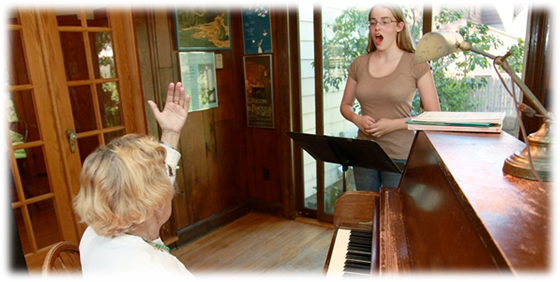Do you need singing lessons or coaching?
In order to sing any type of music well (pop, musical theatre, classical, folk, jazz, ensemble, et cetera,) the student must
1) sing with a clear, pleasant healthy tone that is in tune,
2) sing with a good vocal and dynamic range,
3) project the meaning of the words, and
4) be expressive.
It is necessary to learn music accurately, efficiently, fulfilling the composer’s intentions. Singers must be able to communicate with others using musical terminology.

Private sessions for teens and adults, group lessons for youth (8-12 yrs.)
SINGING LESSONS
- VOCAL TECHNIQUE using graduated/selected exercises that are age & skill appropriate to develop a healthy mechanism
- Intonation, tone quality, voice classification, vowels
- Placement and balanced resonance
- Proper breathing, breath support & control, posture, legato (Bel Canto)
- Registers and development of vocal range, chest voice, falsetto for men
- Diction, articulation, enunciation, use of consonants
- Projection and appropriate dynamic range development
- Vibrato
- Attacks and release, ease and accuracy of attack, avoidance of excessive sliding and swooping
- Vocal concerns, faults, and vocal health (e.g. breathiness; breaks or gaps; weakness in the vocal range; raspy tone; muscular straining in face or neck; tense tongue; rigid or jutting jaw; cracking; inadequate breath; thin, shrill, nasal, hooty sound; vocal injuries).
- MUSICIANSHIP (sight singing, ear training, tonal memory)
- THEORY (basic written language of music which includes key, meter, tempo, phrasing, dynamics, musical markings, elementary harmony)
- USE OF LANGUAGE (e.g. pronunciation, enunciation, diction in English & foreign languages, poetic and literal translations of foreign languages)
- PERFORMANCE TECHNIQUES/PRACTICE (interpretation, expression, presentation, psychological aspects of performance, ensemble with instruments/piano)
- SONG CHOICES or building repertoire (age, skill, voice type appropriate; how to create a repertoire list to use for performance and auditions)
COACHING
Coaching is primarily working on interpretation, performance presentation and performance practice, and assumes the singer knows HOW to use their voice with a healthy solid technique. Coaching generally does not include work on the basic technique as listed above. Coaching does include work on diction and pronunciation, and work on foreign languages if required. A coach will assist with playing piano accompaniments at lessons and guide you with proper score markings. Coaches may help to prepare for recitals and performances and should be knowledgeable about repertoire, performance practice and styles.
